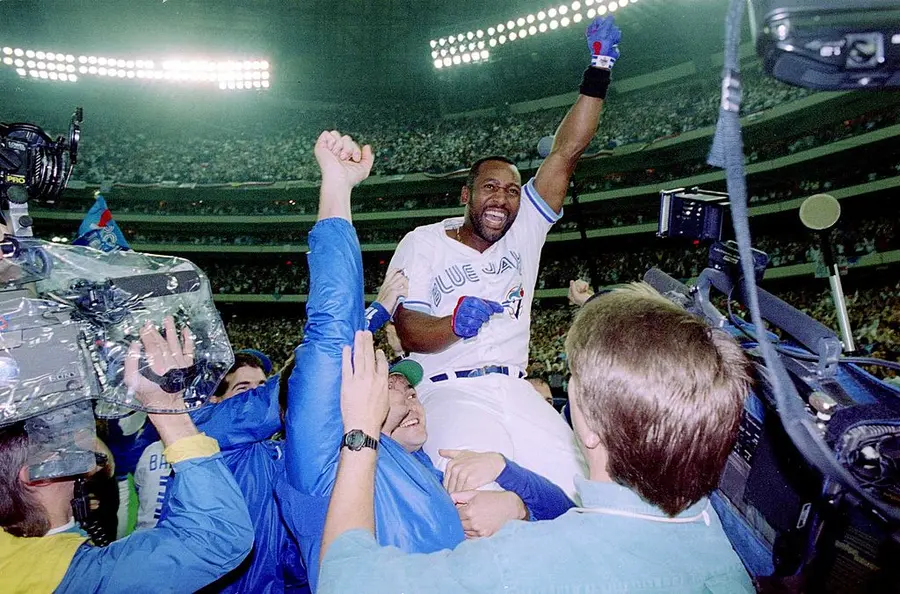What is Joe Carter's net worth?
Joe Carter is an American former professional baseball player who has a net worth of $20 million. Joseph Chris "Joe" Carter is one of the most enduring power hitters of his era, best remembered for delivering one of the most dramatic moments in baseball history—a walk-off three-run home run in the ninth inning of Game 6 of the 1993 World Series that clinched the title for the Toronto Blue Jays and instantly secured his place in the annals of the sport. Over a 16-season major-league career, he compiled 396 home runs and 1,445 runs batted in, both reflecting his consistent presence in major batting-order roles. He earned five All-Star selections and two Silver Slugger Awards, and his ability to perform in high-stakes moments elevated him beyond mere counting stats. Beginning with the Chicago Cubs in 1983 and playing subsequently for the Cleveland Indians, San Diego Padres, Toronto Blue Jays, Baltimore Orioles, and San Francisco Giants, Carter's blend of clutch performance and longevity made him a fan favorite and a frequently cited example of the value of timely power hitting.
Early Life
Joseph Chris Carter was born on March 7, 1960, in Oklahoma City, Oklahoma. He was the eighth of eleven children born to Joseph and Athelene Carter. He attended Millwood High School in Oklahoma City, where he was a multi-sport athlete excelling in baseball, basketball, football, and track. After graduating in 1978, Carter went on to play college baseball at Wichita State University, where he emerged as a standout. At Wichita State, he posted a career batting average of .430 and set the school record with 58 home runs. In 1981, he was named College Player of the Year by The Sporting News and was selected second overall in the MLB draft by the Chicago Cubs.
Major League Career
Carter made his major-league debut on July 30, 1983, with the Chicago Cubs. After just one season in Chicago, he was traded to the Cleveland Indians in June 1984, where he established himself as a middle-of-the-order run-producer. In 1986, he posted .302 with 29 home runs, 121 RBIs, and 29 stolen bases—leading the American League in RBIs and finishing in the top 10 of MVP voting. His slugging power and RBI productivity continued to grow. He joined the San Diego Padres for the 1990 season and then signed with the Toronto Blue Jays, where his legacy moment arrived.
In 1992, he helped Toronto claim its first World Series title and the following year capped a fantastic playoff run by homering in the bottom of the ninth of Game 6 against the Philadelphia Phillies off Mitch Williams: the three-run shot clinched the series for Toronto and remains one of baseball's iconic finishes.
With Toronto, Carter was also an All-Star five times (1991-1993, 1994, 1996) and won Silver Slugger awards in 1991 and 1992. He played in Baltimore and San Francisco during the final season of his career (1998) before retiring. Over his career, he appeared in 2,189 games, recorded 2,184 hits, 396 home runs, and 1,445 RBIs, posting a .259 batting average and .771 on-base plus slugging.

Joe Carter after his famous home run (Photo by Rick Stewart/Getty Images)
Contracts, Salaries & Career Earnings
While complete contract details for every season of Carter's career are not publicly documented, available salary records indicate that by 1998, his cumulative career earnings from salary alone had reached approximately US $47.15 million. (Records show his 1998 salary with Baltimore at $3,151,380 and the total by then at about $47,146,381.) Endorsement income and bonuses are less precisely tracked, but one widely cited estimate places his total career income at around $50 million, including endorsements. Carter's value as a veteran slugger, especially during his peak years in Toronto, allowed him to command top-tier salary levels for the era and sustain productive output well beyond age 30, which added significantly to his career earnings and his value on the open market.
Style & Legacy
Carter combined above-average power with durability and clutch performance, emerging at a time when run production was prized. He may not have posted the rate statistics of Hall of Fame sluggers, but his accumulation of counting stats and his historic walk-off home run in the 1993 World Series provide a narrative that resonates. For the Blue Jays and their fans, his name will always evoke that magical moment in October, and his five-year peak (1991–1996) delivered 30+ home runs and 100+ RBIs consistently. His induction into the Canadian Baseball Hall of Fame and recognition on the Blue Jays' Level of Excellence reflect the enduring impact he had on the franchise and Canadian-based baseball.
Post-Playing Career & Personal Life
After retiring from playing, Carter remained involved in baseball through various roles, including as a motivational speaker. He is married to Diana Tinch (since 1981) and the couple has three children. He resides in Kansas and remains active in alumni circles of both Wichita State and the Toronto Blue Jays. In recognition of his collegiate accomplishments, he was inducted into the Wichita State Athletics Hall of Fame, and his status as a major-league slugger continues to draw interest among fans, historians, and broadcasters.
/2020/01/Joe-Carter.jpg)
/2014/06/GettyImages-612765892.jpg)
/2013/12/Fred-McGriff.jpg)
/2010/08/Sammy-Sosa.jpg)
/2014/11/GettyImages-175735606.jpg)
/2011/08/roberto-alomar.jpg)
/2009/11/George-Clooney.jpg)
/2009/09/Jennifer-Aniston.jpg)
:strip_exif()/2009/09/P-Diddy.jpg)
/2020/04/Megan-Fox.jpg)
/2020/01/lopez3.jpg)
/2019/04/rr.jpg)
/2017/02/GettyImages-528215436.jpg)
/2009/09/Cristiano-Ronaldo.jpg)
/2019/10/denzel-washington-1.jpg)
/2018/03/GettyImages-821622848.jpg)
/2020/06/taylor.png)
/2020/01/Joe-Carter.jpg)
/2014/06/GettyImages-612765892.jpg)
/2011/08/roberto-alomar.jpg)
/2018/12/George-Springer.jpg)
/2013/12/GettyImages-57035103.jpg)
/2014/11/dave-winfield-1.jpg)
/2014/11/Ryne-Sandberg.jpg)
/2009/09/Brad-Pitt.jpg)
:strip_exif()/2015/09/GettyImages-476575299.jpg)
/2020/02/Angelina-Jolie.png)